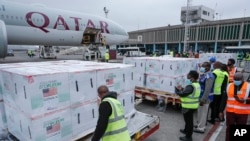American biotechnology firm Moderna has announced plans to build a $500 million vaccine production facility in Kenya. Once built, the facility will produce about half a billion doses of vaccines per year, including vaccines for COVID-19 and HIV. Health experts say the U.S. and African Union-supported facility will help address vaccine inequity in Africa.
Speaking Monday in Nairobi, Kenyan President Uhuru Kenyatta said the partnership with Moderna can help his country and Africa respond to future health crises.
"The idea of companies in the west coming to set up vaccine production centers in Africa is a move in the right direction because it's going to ensure that we are close to the rest of the world in terms of disease prevention," said Rosemary Sang, a virologist based in Kenya.
"I think we have learned what happened in the world during the COVID pandemic, how Africa was also affected when it came to intervention and their distribution mobilization of resources, especially vaccines," said Sang. "Africa was nowhere, almost nowhere, and we only received vaccines after other regions in the world started to do their vaccination and had almost adequate coverage."
Moderna has said it will spend at least $500 million to set up the facility at a yet-to-be-determined site in Kenya. The center will be used to supply vaccines to 55 African countries.
African countries have some of the lowest rates of vaccination in the world – a problem caused partly by the absence of vaccine production plants on the continent.
Sang says an African facility will convince more people to get vaccinated against viruses.
"It's important that we develop this capacity, and we develop the confidence and even to give confidence to the population to accept vaccination as a way of disease control, when they see that vaccines are being made in their own continent, they are not just injected with things that are brought from foreign countries that they may not understand," said Sang.
The Africa Centers for Disease Control and Prevention has been pushing for pharmaceutical companies to set up a manufacturing plant in Africa.
"The more capacity we have to manufacture the vaccines that’s spread across the world, then the faster it is to meet both current but also future demand for vaccines in instances, like the last two years where we had the pandemic and the global supply cannot keep up with the need," said Catherine Kyobutungi, the head of the African Population and Health Research Center.
"I think the other good thing is that it's not just focused on the COVID vaccine. The partnership includes consideration for other products such as the HIV vaccine, vaccine around other viruses," she said. "It may be one way in which Africa is able to meet its demand for those vaccines at some point in future."
Moderna and Kenya’s leaders have not said when construction on the new facility will begin.




